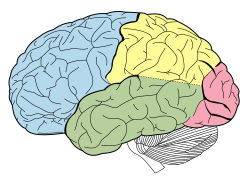Procedural memory is a type of implicit memory (unconscious, long-term memory) which aids the performance of particular types of tasks without conscious...
79 KB (9,803 words) - 10:15, 5 January 2025
Procedural knowledge (also known as know-how, knowing-how, and sometimes referred to as practical knowledge, imperative knowledge, or performative knowledge)...
38 KB (4,830 words) - 22:05, 28 May 2025
can affect thoughts and behaviours. One of its most common forms is procedural memory, which allows people to perform certain tasks without conscious awareness...
41 KB (5,584 words) - 19:04, 25 May 2025
Amnesia (redirect from Memory loss)
episodic memory. Some retrograde and anterograde amnesiacs are capable of non-declarative memory, including implicit learning and procedural learning...
53 KB (6,764 words) - 23:56, 25 May 2025
Anterograde amnesia (section Other memory systems)
having no declarative memory (i.e. no conscious memory of completing the maze exists), the patients still had a working procedural memory (learning done unconsciously...
45 KB (5,985 words) - 06:25, 25 May 2025
semantic memory, while implicit memory includes procedural memory and emotional conditioning. The idea of separate memories for short- and long-term storage...
55 KB (7,012 words) - 15:28, 26 May 2025
with spatial memory. Many methods are used for measuring spatial memory in children, adults, and animals. Declarative and procedural memory fall into two...
63 KB (7,822 words) - 06:02, 2 June 2025
Muscle memory is a form of procedural memory that involves consolidating a specific motor task into memory through repetition, which has been used synonymously...
41 KB (5,205 words) - 01:39, 9 June 2025
autobiographical, and declarative memory, but they can still form new memories because RA leaves procedural memory intact. Depending on its severity,...
45 KB (5,317 words) - 04:34, 25 May 2025
information by way of procedural memory, or a priming phenomenon. Priming is the process of subliminally arousing specific responses from memory and shows that...
138 KB (16,946 words) - 03:21, 11 June 2025
Hyperthymesia (redirect from Superior autobiographical memory)
cortex is involved in the storage of such memory. The caudate nucleus is primarily associated with procedural memory, in particular habit formation, and is...
52 KB (5,626 words) - 22:54, 5 June 2025
Henry Molaison (section Insights into memory formation)
Molaison developed severe anterograde amnesia: although his working memory and procedural memory were intact, because his hippocampi was severed from the rest...
38 KB (4,566 words) - 02:52, 11 June 2025
In computing, procedural generation is a method of creating data algorithmically as opposed to manually, typically through a combination of human-generated...
21 KB (2,275 words) - 05:32, 30 April 2025
Rapid eye movement sleep (section Memory)
aids memory. REM sleep may favor the preservation of certain types of memories: specifically, procedural memory, spatial memory, and emotional memory. In...
70 KB (8,508 words) - 01:12, 9 June 2025
was not surprising for researchers as priming tasks mostly rely on procedural memory, and thus, it benefits more late retention sleep (dominated by REM...
95 KB (11,499 words) - 14:51, 29 March 2025
Cognitive psychology (section Memory)
terms of the level of conscious thought related to their use. Procedural memory is memory for the performance of particular types of action. It is often...
47 KB (5,562 words) - 23:28, 2 June 2025
Non-rapid eye movement sleep (section Memory)
known for its beneficial effect on memory consolidation, especially for declarative memory (while procedural memory improvement is more associated with...
38 KB (4,724 words) - 08:58, 9 June 2025
is involved in the encoding of complex memories, the cerebellum plays a role in the learning of procedural memory, and motor learning, such as skills requiring...
26 KB (3,434 words) - 01:01, 16 December 2023
Spontaneous recovery (section Procedural memory)
Spontaneous recovery is a medical phenomenon of learning and memory. This phenomenon was first coined and described by Ivan Pavlov in his studies of classical...
49 KB (6,560 words) - 16:49, 16 April 2025
Implicit memory is non-declarative memory that relies on past experiences to help recall things without actively thinking of them. Procedural memory, classical...
46 KB (5,829 words) - 07:08, 9 June 2025
Stabilization of a memory is the anchoring of a memory in place, in which a weak connection is established. Stabilization of procedural memories can even occur...
86 KB (11,419 words) - 15:51, 23 May 2025
Sleep (section Memory processing)
to depend on the phase of sleep and the type of memory. For example, declarative and procedural memory-recall tasks applied over early and late nocturnal...
111 KB (12,791 words) - 06:01, 9 June 2025
experiences Procedural memory, a type most frequently below conscious awareness that helps perform particular types of action Muscle memory is a form of...
8 KB (994 words) - 10:29, 14 April 2025
multiple sources of information concurrently to guide behaviour. Procedural memory requires the involvement of the central executive in following verbal...
33 KB (4,179 words) - 14:02, 8 June 2025
form new procedural memories (such as playing the piano) but cannot remember the events during which they happened (See the hippocampus and memory). The...
37 KB (4,572 words) - 00:24, 11 June 2025
greater use of procedural memory than immediately after the initial acquisition tasks. Studies pushing back against a declarative/procedural split relating...
35 KB (4,551 words) - 23:45, 24 May 2025
In psychology, a false memory is a phenomenon where someone recalls something that did not actually happen or recalls it differently from the way it actually...
69 KB (8,242 words) - 01:55, 8 June 2025
Neuropsychological test (section Memory)
sufficient. Semantic memory and episodic memory (collectively called declarative memory or explicit memory); procedural memory and priming or perceptual...
18 KB (1,748 words) - 14:03, 24 October 2024
Procedural memories are a form of nondeclarative memory, so they would most benefit from the fast-wave REM sleep. In a study, procedural memories have...
21 KB (2,469 words) - 12:20, 16 February 2025
Nap (section Learning and memory)
light sleep, deep sleep, and REM sleep. This duration can enhance procedural memory and creativity and usually avoids sleep inertia, as the napper completes...
27 KB (3,277 words) - 09:24, 9 June 2025










